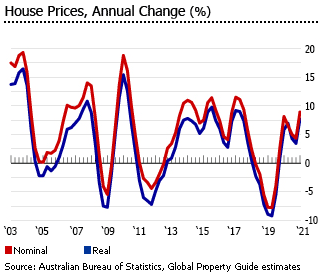Tips for Selling Property in Australia
Tips for Selling Property in Australia

If you are selling property in Australia or real estate in Australia, right now in September 2021, you are essentially in some amount of luck. Australia has been witnessing a dramatic rise in home prices across the past few months, and some economists even define this rise as alarming rather than dramatic. These pundits are concerned potentially because the Australian economy had in fact contracted by about 2.5% in 2020 and is witnessing positive growth in the current year. Possibly, this also indicates that in economic terms, Australia has pushed behind the pandemic and the nation is marching towards normalcy, albeit, at a slow pace.

To help you further, we have culled out some useful tips so that you can extract the best from this booming market.
- Selling Homes in Australia
Put yourself in the shoes of a potential buyer if you are selling homes. Assuming that a buyer is looking at ‘property for sale in Melbourne’ what would be his/her primary considerations? Neighbourhood, schools, hospitals, access to public transport in the immediate vicinity, the overall appeal of the home in terms of well-appointed spaces within and outside the home and of course the price.
- Find your Real Estate Agent
In most situations, selling property in Australia calls for the services of a real estate agent, and therefore you should identify one and authorize him/her to find buyers, negotiate with them, draw up the necessary paperwork and effectively walk you through the entire process. Check with your friends or family members to identify the real estate agent that can guarantee you the desired outcomes. Do not hesitate to interview multiple real estate agents and negotiate their terms. Try to avoid any upfront charges or at least keep it at the minimum.
- Different Methods of Sale
Check with your real estate agent if there are different methods applicable to your real estate in Australia. In some regions, private treaties and sales through auction may be applicable. The process of alienating your property may differ when these options are present. In a sale through a private treaty, you can define an asking price while it would be a guide price in the case of an auction. The asking price should be set in relation to the going price trend for a similar property. If the asking price is very high, your property may not attract buyers.
In an auction sale, make sure that the auction terms are carefully designed so that if the final price is not to your satisfaction, you have the right to call off the auction. The auction sale is generally recommended when you have an irresistible property with multiple buyers evincing interest. But, you may have to wait till the end of the auction to know which side of the bread is buttered.
- Formal Agreement with your Real Estate Agent
Always have a written formal agreement with the real estate agent specifying also whether you are giving the agent any exclusive right to sell the property and the duration over which such a right will hold. Incorporate all fees and any other associated costs that will be charged to you.
- Ensure that there are No Demands or Liabilities on the Property
In some instances, you may have outstanding mortgage dues. Consider if the entire mortgage can be paid off before alienating your property. Most buyers would prefer unencumbered properties so that they can have a lot of peace when they move in and start living. Similarly, also check whether there are bills to be paid for utilities, taxes, and other claims on the property. Maybe, you can negotiate an advance from the buyer to clear these dues if your own finances are constrained. This step is essential for selling property in Australia.
- Spruce Up the Property
Does your home or property for sale need some sprucing up? Make sure that there are no leaky pipes, electrical fittings are functioning properly, no clutter around the home, and generally presentable. Can a coat of paint make your property more desirable and if yes, do not hesitate to spend a small amount on that. Buyers always want to avoid repairs, replacements, etc. as soon as they move in.
- Prepare the Documents
Speak to your estate agent and understand the documentation needed to conclude the sale. Generally, sellers would be required to declare any outstanding mortgage, restrictive covenants on the owner, if any, easements impacting the property (right of way, drainage, power lines, etc. for instance) council zoning, and any other declarations. In most situations, you may also need the services of a conveyance/solicitor to prepare the sale documents, but your estate agent can be of help.
To get the best deal from this booming, market, get in touch with us with your needs and questions
- Zoning, Overlays & Services
A type of local council zoning covers every home in a suburb. This is a planning instruction that tells developers and planners what can be built on different parcels of land. For most houses, the zoning is low-density residential – this means that only houses can be built on this land. But in some areas, high-density zonings are more common, or even mixed-use zonings. And zoning can change, if the plans for your suburb/council change. When a piece of land moves from low-density to higher-density zoning, it has increased in value for a developer.
As a homeowner, you should be finding out the following:
- What is my home’s current zoning?
- Has this zoning changed, or is it set to change?
- Have there been any recent developments near my property?
- Have any of my neighbours been selling to developers?
You may need to speak to the council and look at the LEP (the planning document that affects you) to get some answers. Keeping an eye on local newspapers can also be beneficial, as they may alert you to any upcoming planning changes that could affect your home.
If a planning change is on the cards to happen but hasn’t yet been set in stone, there can still be a way for you to sell by offering the sale on the ‘condition’ of the rezoning going through.
- Perfect land, acreage or development site presentation
As with selling a house, presentation when selling land, acreage or even a development site is just as important. Here are some great tips to ensure your site is prepared and presented in the best possible way:
- Consider your property from the air: In order to give prospective buyers a good indication of property size, condition and inclusions we’ll often use a drone to provide high-quality air imagery. This means there is nowhere to hide, so you need to remove any junk, old falling down sheds, scrap metal, miscellaneous objects or any questionable utility from the property. Make sure you clearly show all property boundaries by removing or trimming overgrown flora (check with council or the RFS first) and by ensuring all fencing, gates and entry points are in a good working condition;
- Boundaries clearly identifiable: Not all prospective buyers can visualise boundaries from a plan. Corner survey pegs should be clearly visible, or replaced if need be. For home lots it’s a good idea to show setbacks on the survey too. Information on location of services such as water, electricity and sewer is all information that can help buyers see the potential in a property and encourage a prompt and successful sales result;
- Provide an indicative layout plan: If your site has development potential, it is important to draft an Indicative Layout Plan (ILP) showing purchasers the potential layout of the subdivision, including the net development area, proposed street pattern, surrounding land uses etc. This will not only provide thorough information to prospective developers/purchasers, but will also demonstrate you understand the true value and potential future use of your site;
- Highlight vantage points: If your property has mountain, water or river vistas ensure you capitalise on these. Remove any obstructions and add some comfortable furniture so that prospective buyers can sit and take in the view;
- Gardens and external grounds freshly mown, neat and tidy: Remove all piles of grass clippings, soil, old tree stumps and any overgrown bushes or unwanted clutter you may have collected over the years. Ensure your property is attractive to buyers from the moment they drive in the front gate. This includes ensuring the council reserve is freshly mown and all visible fencing, gates and security systems are in good working order.
- Timing can be everything
As with most markets, the property market moves up and down in cycles and is susceptible to domestic and international economic conditions. The state of the economy, mortgage interest rates and local supply and demand can have an impact on the real estate market. One of the obvious considerations to maximising your financial return is to leverage the market to your advantage. Selling when the market is hot, and buying when the market has cooled.
Seasonality is also a consideration of timing. Traditionally, the months of autumn and spring are considered the two peak seasons for selling property. The days are warm and bright, the grass green and the warm weather makes for pleasant viewing of properties, or attending auctions. There is argument that these seasons allow you to present your property in the very best light. Conversely and often overlooked, some experts believe that winter also presents an opportune time to sell. With fewer listings in the market there is less competition and this in turn may attract a greater proportion of keen buyers.









